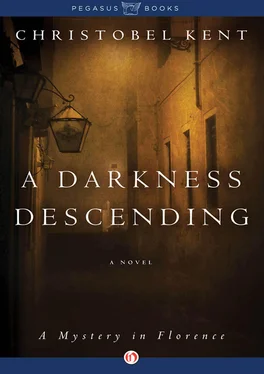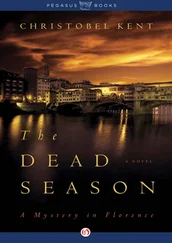Christobel Kent - A Darkness Descending
Здесь есть возможность читать онлайн «Christobel Kent - A Darkness Descending» весь текст электронной книги совершенно бесплатно (целиком полную версию без сокращений). В некоторых случаях можно слушать аудио, скачать через торрент в формате fb2 и присутствует краткое содержание. Год выпуска: 2013, ISBN: 2013, Издательство: Corvus, Жанр: Криминальный детектив, на английском языке. Описание произведения, (предисловие) а так же отзывы посетителей доступны на портале библиотеки ЛибКат.
- Название:A Darkness Descending
- Автор:
- Издательство:Corvus
- Жанр:
- Год:2013
- ISBN:9780857893260
- Рейтинг книги:5 / 5. Голосов: 1
-
Избранное:Добавить в избранное
- Отзывы:
-
Ваша оценка:
- 100
- 1
- 2
- 3
- 4
- 5
A Darkness Descending: краткое содержание, описание и аннотация
Предлагаем к чтению аннотацию, описание, краткое содержание или предисловие (зависит от того, что написал сам автор книги «A Darkness Descending»). Если вы не нашли необходимую информацию о книге — напишите в комментариях, мы постараемся отыскать её.
A Darkness Descending — читать онлайн бесплатно полную книгу (весь текст) целиком
Ниже представлен текст книги, разбитый по страницам. Система сохранения места последней прочитанной страницы, позволяет с удобством читать онлайн бесплатно книгу «A Darkness Descending», без необходимости каждый раз заново искать на чём Вы остановились. Поставьте закладку, и сможете в любой момент перейти на страницу, на которой закончили чтение.
Интервал:
Закладка:
Feeling Giuli’s eyes on him, he stroked his chin. ‘If you know where he lives,’ he began, thoughtfully, ‘how many other people know?’
‘A fair few, I suppose,’ she said guardedly. ‘I mean, he’s known in the quartiere.’
‘No one’s knocking at his door,’ said Sandro. ‘You’d think — there’d be a newspaper guy or two.’
Giuli glanced around quickly. ‘There are journalists hanging about, but — there’s a lot of respect for him. If they started doorstepping him — well, people would intervene.’
Sandro’s gaze wandered over the stallholders, the drunk. ‘I see,’ he said. So the press were only biding their time, staying away out of pragmatism not respect. He puffed out his cheeks. ‘I’m sure they’ll turn up, eventually,’ he said.
And they would: sooner or later there’d be a camera crew on the doorstep and all hell would break loose. He scanned the foot of the palazzo on the far side of the square, Rosselli’s building, the one next to it, further along to where the carabiniere post stood. There was a little gaggle now, three men looking down at something between them, notes passed from one hand to another. Was it them? Had there been enemies at that meeting last night? Despite himself, Sandro was beginning to understand Giuli’s paranoia, and Luisa’s too. Politics was a dangerous game.
And it was time to talk to that lawyer.
Sandro turned his back on the piazza. ‘Let’s go,’ he said.
*
The shop was busy all morning, and Luisa didn’t get to eat until after two. Orario continuato , non-stop shopping, the curse of the modern age. The old two hours for lunch gone for ever, thanks to the hypermarkets. It wasn’t civilized.
Sandro phoned at one, full of something, wanting to talk but she couldn’t because a tour guide had just ushered inside three well-dressed German women in search of wedding suits, and Luisa, apparently, was the only saleswoman who would do. They had been told about her.
An hour later Luisa wondered if she wasn’t getting too old for this as she showed an exquisite Japanese girl — a quarter of her age, half of her size and resembling a cartoon with her pink hair and long black socks — handbags costing the average month’s salary. Her stomach complained: the Japanese girl gave her a politely blank look as its grumbling became audible, and Luisa looked down at the handbags.
Black French calf with silver studs, leather soft as cashmere, made in Italy; a velvet one, testa di moro , with distressed leather handles and brass fastenings. The girl indicated, in a kind of semaphore Luisa had long learned to understand but which did not contain one discernible word of Italian, that she would like them both. It was only when Luisa had wrapped and tied and processed the credit-card transaction — finding herself gazing into the girl’s smooth, wide, placid face and wondering how it could seem so calm when its owner was spending so much, wondering at the life so distant from her own — that she was free to escape. The newspaper tucked under her arm, Luisa hurried down to the magazzino to remove her carefully wrapped sandwich from the fridge, pull out a stepstool and sit down among the boxes and plastic-filmed party dresses.
As she ate Luisa could see herself in the same mirror she’d stood in front of half-dressed that morning. She averted her eyes, and thinking of Sandro’s call she got out her mobile and contemplated it. There was never much of a signal down here, she thought, knowing that she was postponing something. The newspaper sat on her knees, a copy of La Repubblica she had bought for herself to find out their take on Niccolo Rosselli’s collapse. The sandwich had already left an oily mark on it.
There was a clomping on the stairs and Giusy peered around the corner.
‘All right?’ she said, hurrying on down. ‘Gone quiet up there now, and Beppe said he could manage. I’m starved.’
Luisa put the mobile back in her pocket.
There was a bell that went if anyone came into the shop upstairs, and a CCTV monitor, but they couldn’t both stay down here long. Luisa sighed. So much for the lunchbreak. Her head in the fridge, Giusy kept talking, self-absorbed as ever. In spite of it, Luisa was fond of the girl — or no longer a girl, though Luisa had known her since she was nineteen. Close to fifty now and looking it, liplined and deeply tanned after a lifetime’s summers staked out on one beach or another. She’d been to the Maldives this year; she and her husband had no children, and enjoyed their leisure. Good for them, was the conclusion Luisa had eventually come to. Live and let live, though Sandro would laugh if he heard that.
Pulling up another stepstool, Giusy opened her tub of salad. ‘No carbohydrates,’ she’d announced proudly to a customer that very morning, on being congratulated on her figure. And the cigarettes, thought Luisa. To her eye Giusy could do with a bit more weight on her: after a lifetime of frowning over her own tight waistbands, when she’d lost close to fifteen kilos herself on the chemo, Luisa had lost the taste for skinny. Giusy was poking around in the tub with dissatisfaction. Luisa put her crusts in the bin and unfolded the paper.
La Repubblica had it on page five, hardly front-page news for them. Luisa frowned at the picture of a fuzzy Via Sant’Agostino under street lighting, and the same mugshot, only smaller. Dimly the thought of what else she had to worry about chimed and faded as she concentrated on the story about Rosselli. The hospital was running tests: what did that mean? If she had an only son, and they were running tests on him … even the thought of it made her stomach contract as it never had when she’d been the one being tested. What if it were Sandro? Luisa straightened abruptly, startled at the thought, one which had never really occurred to her before, that he might predecease her. Giusy raised her head from her salad bowl at the movement.
Looking from Luisa’s preoccupied expression to the page open on her lap, Giusy’s face cleared. ‘Oh, right,’ she said, and from her tone Luisa knew what was coming next. ‘Communists, aren’t they?’ With disinterested contempt. ‘A rabble, that’s what Antonio says. No backbone. Catch the cavaliere keeling over in front of an audience.’
At the reference to their great leader Silvio Berlusconi, Luisa opened her mouth, then shut it. Berlusconi might not have passed out in front of his public, but he’d humiliated them in the eyes of the world, that was her view. She hadn’t voted, and had incurred a penalty as a result: she had a nasty suspicion that Sandro, in a weak moment, might have voted for the man, though she’d never asked him outright. He was occasionally to be heard saying, ‘Well, he gets things done,’ in a gloomy sort of way.
In her pocket Luisa’s phone chirruped, to indicate a text message: surreptitiously she looked down. Looking into Frazione Verde , it read. Lawyer with Giuli. Missed call from Pietro. What did that mean? She looked back at Giusy with resignation.
That Giusy was a Berlusconiana did not surprise Luisa: the girl was as empty-headed as candyfloss on a stick. And plenty of people had voted for him, no doubt a few decent ones among them, or he wouldn’t be in power, would he?
‘I know his mother,’ said Luisa, and Giusy had the grace to look uneasy.
‘Right,’ she said, busying herself in the near-empty plastic tub, eyes averted. Then raised her head again. Actually,’ she said in a different voice, ‘I think I went to school with him. The Scuola Agnesi, behind Santo Spirito. Before we moved out.’
So the burning-eyed left-winger had been in a scuola elementare — and a notorious hotbed of firebrand teachers — with Giusy. That was a turn-up. By the time Giusy started work in the shop, her family had lived in a comfortable modern apartment in Scandicci, and she was engaged to be married. Luisa had never known she grew up in the grimy old streets of the Oltrarno — and forty years ago, they really had been grimy. Looking at her now, with her eight-hundred-euro jacket and her long pink nails, it was hard to imagine.
Читать дальшеИнтервал:
Закладка:
Похожие книги на «A Darkness Descending»
Представляем Вашему вниманию похожие книги на «A Darkness Descending» списком для выбора. Мы отобрали схожую по названию и смыслу литературу в надежде предоставить читателям больше вариантов отыскать новые, интересные, ещё непрочитанные произведения.
Обсуждение, отзывы о книге «A Darkness Descending» и просто собственные мнения читателей. Оставьте ваши комментарии, напишите, что Вы думаете о произведении, его смысле или главных героях. Укажите что конкретно понравилось, а что нет, и почему Вы так считаете.












